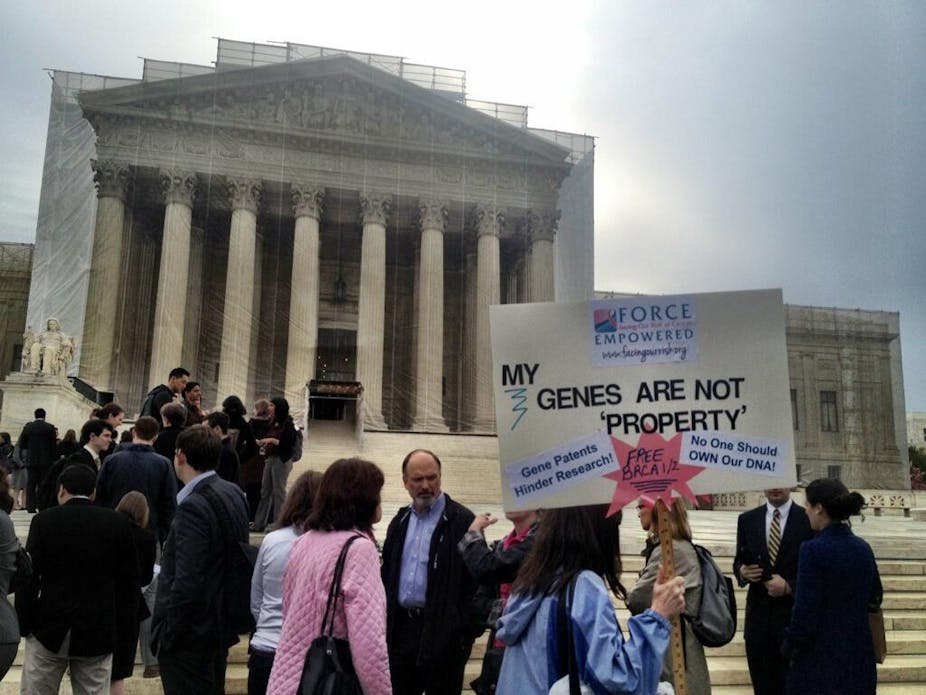Yesterday, the Supreme Court of the United States held oral hearings in a landmark case on patent law and cancer. The question before the court was whether human genes are patentable.
The American Civil Liberties Union and the Public Patent Foundation challenged the validity of two patents held by Myriad Genetics on genes implicated in breast and ovarian cancer. The action was brought on behalf of medical associations, geneticists, breast cancer and women’s health groups, and patients.
The case has been going through the US courts for some years now. In 2010, a district court judge held that Myriad Genetics’ patents were invalid because they claimed products of nature. In 2011, the Court of Appeals for the Federal Circuit overturned that ruling with a majority of two to one.
In 2012, the Court of Appeals for the Federal Circuit reaffirmed the decision, and the Supreme Court of the United States then agreed to hear an appeal.
The court received written submissions from the parties involved as well as others representing a wide array of interests, including pharmaceutical companies, the biotechnology industry, medical associations, patient groups, and civil society activists. Even famous scientists such as James Watson (the co-discoverer of DNA) and Ananda Chakrabarty made submissions.
The court heard oral arguments on the merits of the case. You can click here for the transcript of the hearing.
“The fight to take back our genes”
The American Civil Liberties Union and the Public Patent Foundation framed the dispute as one about human rights, public health, and freedom of speech. Their lawyers sought to give voice to the concerns of cancer patients, researchers, doctors, and pathologists.
They argued that human genes are products of nature, adding that
Myriad has a monopoly on clinical testing of its genes in the US, dictating the type and terms of BRCA genetic testing … Myriad’s claims have had a proven chilling effect on research, as laboratories are dissuaded pursuing scientific work that requires using the patented genes.
The judges appeared wary of accepting a broad prohibition on biotechnology patents under US law. One of the judges, Justice Scalia, asked: “Why would a company incur massive investment if it cannot patent?” The lawyer for the civil liberties union responded that “taxpayers paid for much of the investment in Myriad’s work.”
Indeed, there has been much concern that the contribution of public sector researchers, such as Mary-Claire King, who did a lot of the basic science research that led to the patents, has been neglected in considerations of the patents’ validity.
Myriad Genetics
Myriad Genetics has insisted that “Congress intended statutory subject matter to ‘include anything under the sun that is made by man.’”
It noted that gene patents have been granted by the United States Patent and Trademark Office for 30 years. The lawyer representing the company said,
countless companies and investors have risked billions of dollars to research and develop advances under this promise of stable patent protection.
One of the judges, Justice Breyer, disputed that “anything under the sun” was patentable, noting that “We’ve rejected [the doctrine] more often than we’ve followed it”. Justice Kagan observed that the “United States Patent and Trademark Office seems patent happy”. She asked, if Myriad Genetics could patent genes, could it also patent all kinds of parts of the human body, such as chromosomes, cells, the liver or a piece of kidney.
As indicated by the range of briefs submitted to the court, the ruling will no doubt impact upon medicine, biotechnology, nanotechnology, biomarkers, and personalised medicine.
According to researchers, it could also have significant impacts on other fields of technology, such as “agricultural biotechnology, environmental biotechnology, green-tech, the use of organisms to produce alternative fuels and other applications.”
Uneasy compromises
The brief of the United States Solicitor-General took the middle ground:
Although the incentives created by the patent laws have spawned enormous public benefits, the product-of-nature exception serves important public purposes as well.
Although Justice Alito expressed reservations about the United States Government’s shifting position, Justices Sotomayor, Kennedy and Breyer all seemed interested in its stance. Justice Breyer observed:
Patent law is filled with uneasy compromises, because on the one hand, we do want people to invent; on the other hand, we’re very worried about them tying up some kind of whatever it is, particularly a thing that itself could be used for further advance.
The judges neglected some important issues in the case. The word “health”, for instance, is missing from transcripts indicating that the public health dimensions of the case were not fully explored at the hearing.
An international conflict
There has been much international conflict over Myriad Genetics, and its patents in respect of BRCA1 and BRCA2. Cancer Council Australia also filed a submission to the US Supreme Court, observing that its ruling would be helpful “in providing input into the development of societal opinions and patent law in Australia.”
In February 2013, the Federal Court of Australia rejected a challenge to the validity of Myriad’s BRCA1 patent. The US ruling will undoubtedly be debated in the appeal by Cancer Voices Australia to the Full Federal Court of Australia.
And that litigation will spark further policy debates over gene patents here.
Whatever the outcome, let’s hope the US decision will modernise patent law, so that it will promote the progress of science, while safeguarding human rights, patient care and public health.

